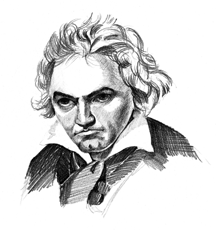 COMPOSERS
COMPOSERS
IN
LOVE
Musicians have long expressed their deepest emotions through their music. Classical music composers are no exception—while their passionate loves didn’t always endure, the music they inspired remains.
Ludwig von Beethoven
Therese von Brunswick
And so they walked, Beethoven and Therese, to the tree that bore his name, where this great of great composers began to express himself in the imperfect language of words.
"Come, let us go out into the garden, where Beethoven stands growing. I have something to tell you, my dear. . . Look, I can’t make gallant speeches," Beethoven stumbled, "It’d be a waste of time if I could. The point is I love you, Therese."
She clasped her hands and her breath came as if she had been running.
He continued, ". . .I’ve loved you all along, only I hadn’t the wit to know it. The sense of contentment you bring me. . .the something that draws me to you. . .it’s because I love you, not for a game or a thrill, but deeply. As a man hopes to love."
She took his face between her hands and looked into his eyes.
"I love you and love you. . .nothing can change that." Surrounded by the trees that were their friends, Beethoven took Therese in his arms. (as related in Like Softest Music by Rose Heylbut, pg. 52).

But their love was never meant to be. Therese’s brother, concerned over Beethoven’s wild moods and his sister’s delicate nature, counseled them to keep the betrothal secret for at least a year as a sort of testing ground for their compatibility—asserting that a great deal of unpleasantness could be avoided with this arrangement. Then in a year, if all was well both lovers would be sure of the match. Beethoven agreed, but became increasingly frustrated with the situation. Therese seemed content in this limbo, even withdrawing her arm and abruptly ending their conversations when others were present. The charade drove the composer near madness, believing that Therese was only postponing an eventual breakup. They quarreled bitterly over trifles, deepening Beethoven’s resentment and Therese’s sinking despair. When Beethoven offered Therese her freedom, she took it, believing no woman could ever be enough for this man.
"He is not like other men. He has a mighty work to perform," mourned Therese, "and if I were to be the cause of undoing it. . .he would grow to hate me." (Heylbut, pg. 57)
Inadequacy filled both lovers, and they parted ways, still very much in love.
Carl Maria von Weber
Therese Brunetti Caroline Brandt
Like Beethoven, Carl Maria von Weber had his own Therese to contend with. Therese Brunetti was a fiery creature with melting eyes and a sinuous figure who captured Weber’s devotion. Carl Maria had come to Prague to direct operas where he met Therese while she watched rehearsals in the wings. Before Prague, Weber acted as the playboy of Europe, drifting through parties and love affairs almost as fast as he composed music. Born sickly to consumptive young Genoverfa von Brenner and Franz Anton, he was thrust almost at birth by his father into the music world. Franz Anton von Weber, a musical vagabond at best, hoped that one of his children would be the next Mozart. After much dedication to the art, Carl Maria von Weber’s talent captured an audience and the attention of his Therese.
Therese was a demanding woman, and Weber ran himself ragged running errands for her, missing his dinners as he waited for her to come home, or dashing about town to buy her some trinket she fancied. Her temperament also caused Weber much grief. Caressing him one day only to insult him the next; she led him on, laughed at him, went about with other men and caused scenes if he objected. His diary reveals his mournful mood.
 "A fearful scene. . .The sweet dream of my life is over. I shed the first tears my grief has wrung from me." (Heylbut, pg. 77-8)
"A fearful scene. . .The sweet dream of my life is over. I shed the first tears my grief has wrung from me." (Heylbut, pg. 77-8)
However, this turbulent love affair would take a dramatic swing, and all over a plate of oysters.
For Therese’s birthday, Weber bought a beautiful gold watch, and ransacked the city looking for other symbolic gifts of love. As a finishing touch he also ordered a plate of oysters, a rare delicacy in Prague during those days. Upon seeing the oysters, Therese rushed passed the other gifts and threw herself upon the oysters, devouring them with such horrid gluttony that even Carl Maria’s blinded eyes were shocked into reality. His fascination with Therese was at an end.
Weber could not escape into his music as Beethoven did, taking instead the love of another woman to revive him. Caroline Brandt, the celebrated operatic soprano in Cinderella and other first class operas mended Weber’s broken heart. He later married the soprano, and the two enjoyed a long and successful career with Caroline as Carl Maria’s biggest support.
Frederick Chopin
George Sand
When Chopin met the small, plump George Sand, she was most likely smoking a cigar, dressed in men’s attire, and voicing one of her modern opinions on personal liberty. Chopin was all but repulsed by both Sands’ masculine mannerisms and her outspoken nature. In fact, he is noted to have wondered aloud, "But is she really a woman? I am inclined to doubt it." Not exactly love at first sight.
Sand was unlike any of the other women Chopin had fallen in love with. She was not beautiful, nor did her voice ring sweetly in his ears (hers was harsh and raspy). Moreover Sand was notorious for her numerous and erratic love affairs while Chopin loved only a few, but deeply.
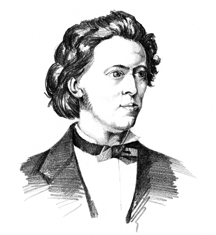 After their first meeting, the two met several times over the next few years. Soon they became old acquaintances. Eventually Chopin’s initial distaste for Sand began to fade and mutual romantic feelings took root. When she invited him to accompany her on a trip to the Island of Majarca, Chopin accepted, though not without reservation. He had recently been ill and was reluctant to make the trip, but Sand assured him the warm tropical climate would do him well. Unfortunately, she was wrong. One week after their arrival, Chopin became ill with a severe bronchial cold. George did her best to care for her friend, but eventually they had to return home.
After their first meeting, the two met several times over the next few years. Soon they became old acquaintances. Eventually Chopin’s initial distaste for Sand began to fade and mutual romantic feelings took root. When she invited him to accompany her on a trip to the Island of Majarca, Chopin accepted, though not without reservation. He had recently been ill and was reluctant to make the trip, but Sand assured him the warm tropical climate would do him well. Unfortunately, she was wrong. One week after their arrival, Chopin became ill with a severe bronchial cold. George did her best to care for her friend, but eventually they had to return home.
By the time their lengthy vacation was over, Chopin had become part of the Sand household and the two were quite comfortable with their relationship. In Paris they tried living apart but found they much preferred each other’s company. They spent the next six years together—not solely as friends nor entirely devoted lovers. Perhaps more than anything their relationship was one of convenience. Chopin was assured care and companionship and Sand finally felt something closer to love than she had ever known.
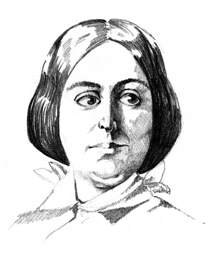 Towards 1842 Chopin’s health grew worse. Sand continued to nurse him, devoting most of her time and effort to his care. In return, Chopin tried his best to please Sand by hiding his grief and pain. But even then, Sand grew weary of caring for her invalid-lover. But she was not cruel, and would never leave him.
Towards 1842 Chopin’s health grew worse. Sand continued to nurse him, devoting most of her time and effort to his care. In return, Chopin tried his best to please Sand by hiding his grief and pain. But even then, Sand grew weary of caring for her invalid-lover. But she was not cruel, and would never leave him.
Ironically, the end to their relationship centered around a quarrel between George’s son Maurice and her daughter Solange. George sided with Maurice and Chopin with Solange. Eventually Maurice decided he could not live in the same house as Chopin, whom he claimed was turning his mother into a slave. Chopin left the house, feeling like another one of Sand’s cast off lovers. And though he missed her dearly, when they saw each other (by chance) for the last time, Chopin was icy and made no reply when George asked about his health.
Robert Schumann
Clara Weick
Robert and Clara met when young Schumann went to study and train in piano performance under Clara’s father. Although Clara was only nine at the time, she shared Schumann’s love of the piano and was already a more celebrated pianist than he. Unfortunately, Clara’s talent at the keyboard was not driven by her own passion for music, but by her father’s. Thus, Schumann felt genuinely sorry for the little prodigy and tried his best to amuse her and make her smile. At this he surely succeeded and the two became close friends. But as time passed Clara began to recognize that she loved Robert for more than his friendship and child’s games. However, before Clara could express her ardent affections to Robert, his mother ordered him to study law at the University of Heidelberg. He left never knowing that Clara secretly loved him.
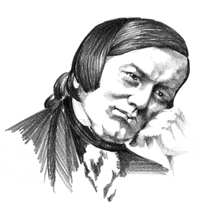 While at Heidelberg, Schumann tried his best to get himself expelled. After 18 months he was released from Heidelberg for his outrageous behavior, and he vowed he would never work seriously at anything but music. He then returned to his studies under Meister Weick working tirelessly to improve on his talents. So desperate to hasten his success, Schumann attempted to artificially strengthen his fingers. But the attempt failed and left one of Schumann’s fingers permanently damaged. His career as a pianist was over.
While at Heidelberg, Schumann tried his best to get himself expelled. After 18 months he was released from Heidelberg for his outrageous behavior, and he vowed he would never work seriously at anything but music. He then returned to his studies under Meister Weick working tirelessly to improve on his talents. So desperate to hasten his success, Schumann attempted to artificially strengthen his fingers. But the attempt failed and left one of Schumann’s fingers permanently damaged. His career as a pianist was over.
Deprived of his beloved piano, and with little success as a composer, Schumann turned to worldly pleasures and other gentlemanly affairs for fulfillment. After many fleeting romantic relationships, he became engaged to fellow pupil Ernstine von Fricken. Meister Weick was pleased to learn of the sparking romance between his two students, but Clara was torn and left for a tour of Europe broken hearted.
While Clara toured Europe and tried to forget her unrequited love, Robert Schumann was growing tired of his fiance and her boisterous companionship. He realized that Ernstine could never provide the fulfillment he required. And when Clara returned he looked to her for the quiet gentleness and understanding he longed for. She was no longer the timid little girl he had once known; now she was a beautiful and dignified woman.
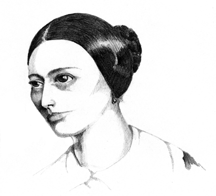 Schumann quickly broke off his engagement to spend time with Clara. And although his visits much delighted her, Clara’s father was infuriated. He banished Schumann from the house and forbade Clara to see him. Over the next six years Clara and Robert rarely saw each other, and only communicated through letters.
Schumann quickly broke off his engagement to spend time with Clara. And although his visits much delighted her, Clara’s father was infuriated. He banished Schumann from the house and forbade Clara to see him. Over the next six years Clara and Robert rarely saw each other, and only communicated through letters.
During this time Clara’s only delight was found in playing the pieces which Schumann composed. The more she played them, the more popular they became. Thanks to Clara, Schumann and his very original pieces became increasing famous.
Finally, when Clara was 21 the two could be legally married. According to an old Saxon statute, if her father objected to the marriage, he would have to prove the validity of his reasons in court. In the end, Meister Weick could not find enough proof to sway the court in his favor and on September 12, 1840 Clara and Schumann were finally married. As a wedding gift to his bride, Schumann gave Clara a specially bound copy of his Opus 25 entitled Myrtles.
"Beethoven" & "Weber by Holly R. Hansen
"Chopin" & "Schumann" by Tana Nguyen